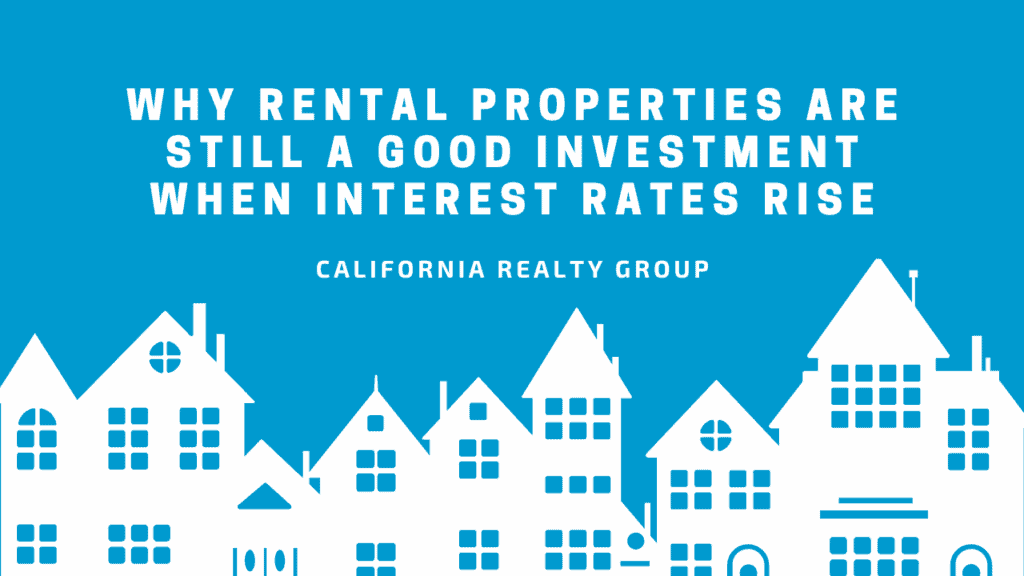Why Rental Properties Are Still a Good Investment When Interest Rates Rise
Key Takeaways
- Rental properties can still offer strong returns when interest rates rise, especially if you focus on long-term gains.
- Demand for rentals often increases when buying becomes less affordable, giving landlords a steady stream of potential tenants.
- Real estate keeps up with inflation better than many other investments, and it comes with valuable tax benefits.
- Locking in a fixed-rate mortgage now could help you stay ahead in the future if rates continue to climb.
Rising interest rates often trigger concern among investors, especially those with mortgages tied to rental properties. At first glance, higher rates may seem like a deterrent to buying or holding onto real estate. After all, they increase borrowing costs and reduce short-term affordability.
However, when examined from a long-term investment perspective, rental properties continue to offer significant advantages, even in a high-interest environment. In many cases, they become more attractive compared to alternative investments.
The team at California Realty Group has created this guide on why you should consider investing in rental properties even with rising interest rates:
Real Estate Is a Hedge Against Inflation
One of the most compelling reasons rental properties remain a solid investment during interest rate hikes is their ability to hedge against inflation. As inflation rises, so do the costs of goods and services, including rent.
Landlords can adjust rental prices over time to keep up with inflation, whereas many other investments do not offer this kind of flexibility. In contrast to bonds or savings accounts, which often lag behind inflation, real estate naturally keeps pace with or even surpasses it.
This is particularly advantageous during periods when central banks raise interest rates to combat rising prices. While your mortgage payments might be higher if you’re buying a new property, the rental income you generate can also increase to help offset those costs.
Rent Demand Often Increases
Another often-overlooked advantage is the increased demand for rentals that typically accompanies higher interest rates. When borrowing becomes more expensive, many would-be homebuyers delay their purchase decisions. This leads to a larger pool of renters looking for housing, which creates upward pressure on rental rates and decreases vacancy risk for landlords.
In cities with housing shortages or low homeownership affordability, landlords can benefit from this rental demand surge. Even if your mortgage is slightly more expensive, your occupancy levels may remain high and consistent, supporting stable cash flow.
Real Estate Offers Tangible, Appreciating Assets
Real estate is a physical asset with intrinsic value. It doesn’t vanish like stock value during a market crash, and it doesn’t rely solely on sentiment or speculation. Land typically appreciates over time, and buildings, if well maintained, retain or grow in value.
This appreciation can continue even when interest rates rise, especially in markets where population growth, job opportunities, and infrastructure development persist. A well-selected rental property can deliver consistent long-term growth through both cash flow and equity buildup.
Unlike more volatile investments, rental properties provide owners with a sense of control. You can improve a property, increase rent, change property management strategies, or even refinance at a more favorable rate in the future. These levels of control and long-term predictability make rental properties an enduring option for building wealth.
Locking in a Fixed-Rate Mortgage Now Can Pay Off Later
Even if today’s rates seem high compared to recent years, they might still be low historically. Investors can use this opportunity to lock in a fixed-rate mortgage before rates rise further. While your payments may be more expensive now than in the past, they remain stable over the life of the loan.
This is a major benefit compared to adjustable-rate options or other variable investments, where changing economic conditions can impact your cash flow unpredictably. Fixed mortgage payments combined with increasing rents can create wider profit margins over time.
Moreover, if rates drop again in the future, refinancing becomes a tool to improve cash flow and further increase profitability.
You Still Benefit from Tax Deductions and Depreciation
Rising interest rates do not eliminate the tax advantages of owning rental property. Mortgage interest, property taxes, repairs, insurance, depreciation, and professional services are still deductible. These deductions can significantly reduce your taxable rental income, softening the impact of increased financing costs.
Depreciation, in particular, is a powerful tool. It allows you to deduct a portion of the property’s value over time, even if the property is appreciating in reality. This unique benefit is exclusive to physical assets and can be used to lower tax liabilities while growing long-term wealth.
Real Estate Still Beats Many Other Investments
When interest rates rise, the stock market often reacts negatively. Investors pull out of equities and bonds to seek safer options. But in the midst of that movement, real estate often continues to perform well, especially rentals.
Compared to savings accounts, whose yields may rise slowly and barely outpace inflation, or the unpredictable swings of stocks, real estate offers a blend of cash flow and long-term appreciation. If you’re willing to hold the property for years and manage it effectively, the investment continues to build equity, even if the initial yield appears lower due to financing costs.
Strategic Moves Make the Difference
Successful investors understand how to adapt when market conditions shift. Here are a few strategic approaches that help rental property owners stay profitable when interest rates are high:
1. Prioritize Cash Flow Over Speculation
Look for properties with strong existing rental income rather than betting on appreciation alone. A cash-flowing property helps cover your expenses and builds a financial cushion, regardless of interest rate trends.
2. Reduce Operating Costs
Increasing efficiency in how you manage your property, such as upgrading to energy-saving appliances, improving maintenance scheduling, or handling turnovers efficiently, can improve your profit margins.
3. Explore Creative Financing
Consider seller financing, lease options, or partnerships that may offer better terms than traditional lenders. In a competitive lending environment, flexibility can be a key advantage.
4. Revisit Rent Pricing Annually
Make sure you’re adjusting rent according to the market. This ensures you’re keeping pace with inflation and covering any increases in your expenses.
How a Property Management Company Can Help
Managing rental properties during economic shifts requires more than just holding the property. That’s where a professional property management company like California Realty Group can play a vital role.
A property manager can help you:
- Set competitive rent based on market data, ensuring your property remains both profitable and attractive to renters.
- Market the unit effectively, reducing vacancy time and helping you find quality residents faster.
- Screen tenants thoroughly, minimizing the risk of non-payment or early move-outs, especially when economic pressures affect renters.
- Handle maintenance and repairs efficiently, often at better rates due to existing vendor relationships.
- Stay compliant with changing laws and regulations that can come into play when the housing market tightens.
Final Thoughts
Interest rate hikes are part of every economic cycle. While they may seem intimidating at first, they don’t eliminate the value and potential of rental property investing. If anything, they highlight the need for thoughtful strategy, long-term perspective, and smart property selection.
Rental properties continue to deliver a unique mix of cash flow, tax advantages, inflation protection, and long-term appreciation, even when borrowing becomes more expensive. By focusing on well-located properties, managing your finances wisely, and working with professionals like California Realty Group to handle day-to-day operations, you can continue building wealth confidently, regardless of where interest rates go next.
Contact California Realty Group today to learn more about what we can do for you.





